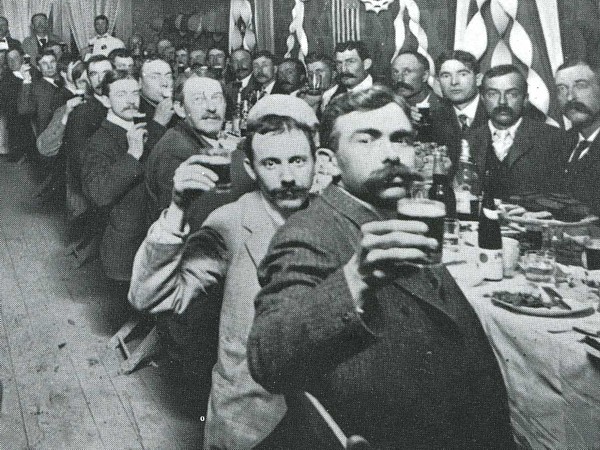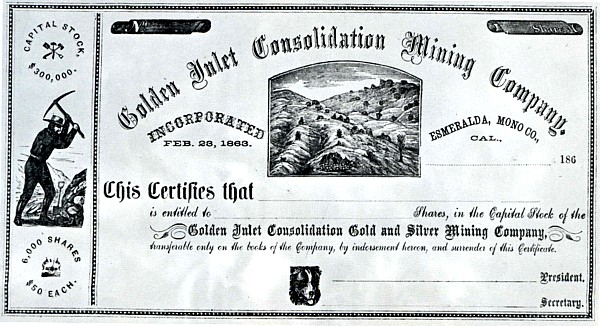
 |
Nevada Nabobs of Sudden Wealth |
.
| Men who had
suddenly struck it rich were not terribly uncommon in those days. Unfortunately, many were unprepared for wealth and they
were parted with their fortunes not many years later. Mark Twain knew a number of them and
here he tells the stories of some of these suddenly very wealthy bumpkins. ----------- There were nabobs in those days - in the "flush times," I mean. Every rich strike in the mines created one or two. I call to mind several of these. They were careless, easy-going fellows, as a general thing, and the community at large was as much benefited by their riches as they were themselves - possibly more, in some cases. Two cousins, teamsters, did some hauling for a man and had to take a small segregated portion of a silver-mine in lieu of three hundred dollars cash. They gave an outsider a third to open the mine, and they went on teaming. But not long. Ten months afterward the mine was out of debt and paying each owner eight to ten thousand dollars a month - say one hundred thousand dollars a year. One of the earliest nabobs that Nevada was delivered of wore six thousand dollars' worth of diamonds in his bosom, and swore he was unhappy because he could not spend his money as fast as he made it. Another Nevada nabob boasted an income that often reached sixteen thousand dollars a month; and he used to love to tell how he had worked in the very mine that yielded it, for five dollars a day, when he first came to the country. The silver and sage-brush state was knowledge of another of these pets of fortune - lifted from actual poverty to affluence almost in a single night - who was able to offer one hundred thousand dollars for a position of high official distinction, shortly afterward, and did offer it - but failed to get it, his politics not being as sound as his bank-account. Then there was John Smith. He was a good, honest, kind-hearted soul, born and reared in the lower ranks of life, and miraculously ignorant. He drove a team, and owned a small ranch - a ranch that paid him a comfortable living, for although it yielded but little hay, what little it did yield was worth from two hundred and fifty to three hundred dollars in gold per ton in the market. Presently Smith traded a few acres of the ranch for a small undeveloped silver-mine in Gold Hill. He opened the mine and built a little unpretending ten-stamp mill. Eighteen months afterward he retired from the hay business, for his mining income had reached a most comfortable figure. Some people said it was thirty thousand dollars a month, and others said it was sixty thousand dollars. Smith was very rich, at any rate. |
.-g.-. | |
| And then he went to Europe and traveled. And when he came back he
was never tired of telling about the fine hogs he had seen in England, and the gorgeous
sheep he had seen in Spain, and the fine cattle he had noticed in the vicinity of Rome. He
was full of the wonders of the Old World, and advised everybody to travel. He said a man
never imagined what surprising things there were in the world till he had traveled. One day, on board ship, the passengers made up a pool of five hundred dollars, which was to be the property of the man who should come nearest to guessing the run of the vessel for the next twenty-four hours. Next day, toward noon, the figures were all in the purser's hands in sealed envelopes. Smith was serene and happy, for he had been bribing the engineer. But another party won the prize! Smith said: "Here, that won't do! He guessed two miles wider of the mark than I did." The purser said, "Mr. Smith, you missed it further than any man on board. We traveled two hundred and eight miles yesterday." "Well, sir," said Smith, "that's just where I've got you, for I guessed two hundred and nine. If you'll look at my figgers again you'll find a 2 and two o's, which stands for 200, don't it? - and after 'em you'll find a 9 (2009), which stands for two hundred and nine. I reckon I'll take that money, if you please. "The Gould & Curry claim comprised twelve hundred feet,
and it all belonged originally to the two men whose names it bears. Mr. Curry owned
two-thirds of it - and he said that he sold it out for twenty-five hundred dollars in
cash, and an old plug horse that ate up his market value in hay and barley in seventeen
days by the watch. And he said that Gould sold out for a pair of second-hand government
blankets and a bottle of whisky that killed nine men in three hours, and that an
unoffending stranger that smelt the cork was disabled for life. Four years afterward the
mine thus disposed of was worth in the San Francisco market seven millions six hundred
thousand dollars in gold coin. A youth of nineteen, who was a telegraph operator in
Virginia on a salary of a hundred dollars a month, and who, when he could not make out
German names in the list of San Francisco steamer arrivals, used to ingeniously select and
supply substitutes for them out of an old Berlin city directory, made himself rich by
watching the mining telegrams that passed through his hands and buying and selling stocks
accordingly, through a friend in San Francisco. Once when a private despatch was sent from
Virginia announcing a rich strike in a prominent mine and advising that the matter be kept
secret till a large amount of the stock could be secured, he bought forty "feet"
of the stock at twenty dollars a foot, and afterward sold half of it at eight hundred
dollars a foot and the rest at double that figure. Within three months he was worth one
hundred and fifty thousand dollars and resigned his telegraphic position. |
. | |
Another
telegraph operator, who had been discharged by the company for divulging the secrets of
the office, agreed with a moneyed man in San Francisco to furnish him the result of a
great Virginia mining lawsuit within an hour after its private reception by the parties to
it in San Francisco. For this he was to have a large percentage of the profits on
purchases and sales made on it by his fellow-conspirator. So he went, disguised as a
teamster, to a little wayside telegraph-office in the mountains, got acquainted with the
operator, and sat in the office day after day, smoking his pipe, complaining that his team
was fagged out and unable to travel - and meantime listening to the despatches as they
passed clicking through the machine from Virginia. Finally the private despatch announcing
the result of the lawsuit sped over the wires, and as soon as he heard it he telegraphed
his friend in San Francisco: "Am
tired waiting. Shall sell the team and go home." Mark Twain’s stories about his experiences prospecting in
the west, including many more humorous tales of his adventures can be found in his book: ROUGHING IT |
. |
.
 |
Miners with money never hesitated to celebrate. |
 |
Stock certificates such as this one from the time frame that Twain was in Esmerelda, made some men very wealthy. |
Please note that the author, Chris Ralph, retains all copyrights to this entire document
and it may not be reproduced, quoted or copied without permission.
About OUR Nevada Turquoise
All of the turquoise sold on this site is mined from our own mines in Nevada. No one can offer a stronger assurance of the origin and natural nature of gem turquoise than we can for our turquoise - after all we are the ones who pulled it from the ground. We offer a free virtual tour of our mines, so you can see the real "Nevada Outback" conditions where our turquoise originated. Come a see what mining turquoise in Nevada is all about - CLICK HERE.